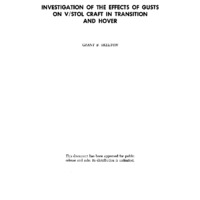-
Title
-
Investigation of the Effects of Gusts on V/STOL Craft in Transition and Hover
-
Date
-
1968
-
Index Abstract
-
Not Available
-
Photo Quality
-
Not Needed
-
Report Number
-
AFFDL TR 68-85
-
Corporate Author
-
Honeywell, Inc.
-
Corporate Report Number
-
Honeywell ADG Report 12060-FR1
-
Laboratory
-
Air Force Flight Dynamics Laboratory
-
Extent
-
244
-
Identifier
-
AD0679593
-
AD0679593
-
Access Rights
-
This document has been approved for public release and sale; its distribution is unlimited
-
Distribution Classification
-
1
-
Contract
-
F33615-67-C-1563
-
DoD Project
-
None Given
-
DoD Task
-
None Given
-
DTIC Record Exists
-
Yes
-
Distribution Conflict
-
No
-
Abstract
-
The concern in the work reported is the development of statistical models for the gust environment in the earth's boundary layer for use in determining the gust response characteristics of V/STOL aircraft. A general gust model based upon published gust data was developed, and analyses of V/STOL responses with that model were conducted to determine the gust descriptors significant to V/STOL performance. An interim gust model embodying the significant descriptors was then developed for use in V/STOL gust analyses. Suggestions for meteorological experiments to measure the significant descriptors are made. The significant gust descriptors determined from the analyses are the diagonal terms of the gust covariance tensor, gust probability distributions, mean wind probability distributions, and the dependencies of these statistics on thermal stability, surface roughness, and altitude. Less critical descriptors include the off-diagonal components in the gust covariance tensor and the space-time interplay in that tensor. The significant gusts seen by the aircraft are head-on and vertical gusts on the wings; head-on and vertical gust shears across the wings; head-on, side, and vertical gusts on the tail; and head-on and side gusts on the fuselage. Mean airspeed and sideslip angle are important parameters in V/STOL gust responses. The wing-to-tail transport delay of the gusts in forward flight also has a significant effect. V/STOL gust responses at low airspeeds are generally small due to the low dynamic pressures, and the responses are decidedly nonlinear except at low gust amplitudes.
-
Report Availability
-
Full text available
-
Date Issued
-
1968-10
-
Provenance
-
Bombardier/Aero
-
Type
-
report
-
Subject
-
Vertical Takeoff Aircraft
-
Gusts
-
Flight
-
Response
-
Low Altitude
-
Statistical Analysis
-
Aircraft Landings
-
Gust Loads
-
Hovering
-
Probability
-
Mathematical Models
-
Takeoff
-
Format
-
1 online resource
-
Creator
-
Skelton, Grant B.
 AFFDLTR68-085.pdf
AFFDLTR68-085.pdf